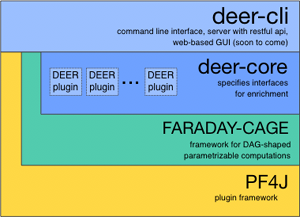Linked Data enrichment is the process of adding, altering or deleting the set of triples of an input dataset in order to obtain an enriched version of it. This enriched dataset usually provides significant benefits for specific use case scenarios. These benefits include (but are not limited to) more data (quantity), better data quality, better data organization (refined ontology) and interoperability with other datasets (interlinking).
<link http: aksw.org projects deer _blank>DEER is a linked data enrichment framework that provides one main type of artifact: enrichment operators. Thus, in the case where a user knows the type of enrichment that is to be carried out, (s)he can define a <link http: aksw.org projects deer _blank>DEER configuration in a form of directed acyclic graph (<link https: en.wikipedia.org wiki directed_acyclic_graph _blank>DAG) of enrichment operators to be used by <link http: aksw.org projects deer _blank>DEERto process a set of one or more input datasets. The task of an enrichment operator is to determine the set of triples to be added, altered or deleted from one or more source datasets to generate one or more enriched datasets. Each of such enrichment operators accepts a set of one or more input dataset(s) and also a set of one or more output datasets.
Currently,<link http: aksw.org projects deer _blank>the set of enrichment operators provided by <link http: aksw.org projects deer _blank>DEER includes dereferencing, linking, conformation, filtering, geo-fusion and NLP. For instance, the idea behind the dereferencing enrichment operator is to find enrichment data from interlinked datasets. That is, for a source dataset which contains owl:sameAs or similar links,<link http: aksw.org projects deer _blank>it will dereference all links from this dataset to other datasets by using content negotiation on HTTP in order to add relevant information from the returned set of triples to the input dataset.
We are happy to announce <link https: github.com dice-group deer releases tag _blank>DEER 1.0.0 – the first release of the the RDF data enrichment and transformation framework. The main feature we provide in the current version is the extensibility of DEER, i.e. that it is easy-to-implement custom enrichment operators with arbitrarily complex configurations. The following features are currently supported by <link http: aksw.org projects deer _blank>DEER:
Support for multiple datasets as input
Support for multiple datasets as output
Introducing the new directed enrichment graph for configuration
Simplified and more powerful RDF configuration file
New core with dynamic parallel implementation planning for time efficient enrichment process execution for big datasets
New geo-fusion operator for merging various geospatial datasets into one fused dataset with many alternative fusion policies
New DEER server
<link https: dice-group.github.io deer _blank>User manual
Migrated codebase to Java 9 and Jena 3.6.0
Stay tuned for our next releases where we will include supervised machine learning algorithms to ease the process of <link http: aksw.org projects deer _blank>DEER configuration. In our next release we will include a new web based graphic user interface, and as usual more enrichment operators, better performance and bug fixes.
We would like to thank everyone who helped to create this release. We also acknowledge the support of the<link https: www.sake-projekt.de en start _blank><link http: slipo.eu _blank>SLIPO and<link https: project-hobbit.eu _blank><link http: sageproject.eu _blank>SAGE projects.


